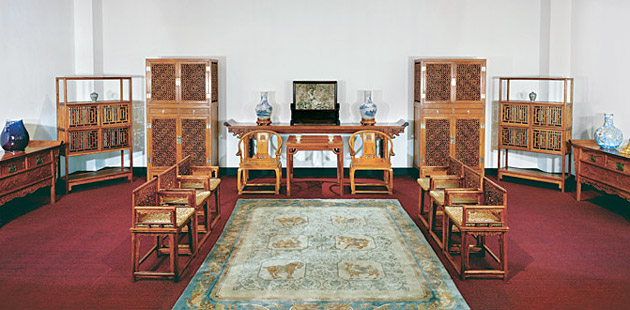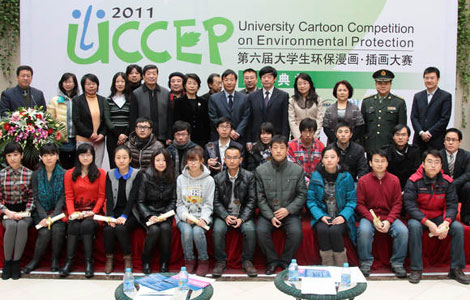Sci-fi fan gets wish to influence future
Updated: 2011-12-29 07:55
By Mark Hughes (China Daily)
|
|||||||||||
|
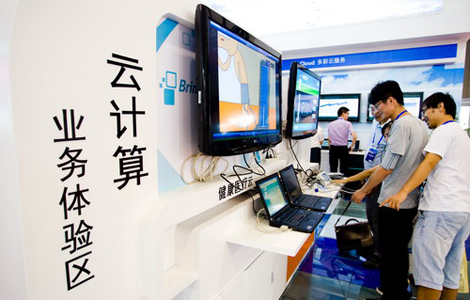 Shoppers try out cloud computing at the 7th China International Software Product & Information Service Expo in Nanjing, Jiangsu province. Kinect, an entertainment device developed by Microsoft Corp, holds the Guinness World Record for being the "fastest selling consumer-electronics device". [Photo / China Daily] |
BEIJING - The essence of technology is that it is man's attempts to get a grip on the future.
So it comes as no surprise to learn that Rick Rashid, chief research officer at Microsoft Corp, is something of a science fiction buff.
What ought not to come as a surprise, but still somehow manages to, is that he wears a Star Trek costume to the cinema whenever a new movie from the television series of the same name is released. The film character that he believes he most admires is Captain Jean-Luc Picard, played by the Royal Shakespeare Company actor Patrick Stewart.
Picard is a highly moral, intelligent technician with the eloquence and tact of a diplomat. After spending an hour in Rashid's company, it becomes easier to see the connection. Slick without being oleaginous, dressed in an immaculate suit and shoes so shiny you could use them as a mirror for shaving, and possessed of an oratorical eloquence developed from years spent as a lecturer ever seeking to summon students' attention, Rashid, it quickly becomes apparent to an observer, is naturally suited for leadership. It is easy to imagine him ordering subordinates to "make it so", just as his hero of the TV and silver screen does.
Why Picard? "He had this group of people that he believed in, that he relied on and that he gave a lot of responsibility and authority to within their own areas. I believe in hiring really great people and in giving them the freedom to do what they know how to do," said the father of five.
|
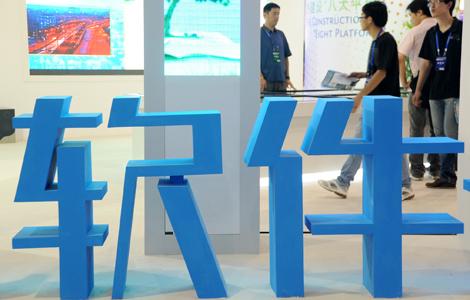 People attend the opening ceremony of the 7th China International Software Product & Information Service Expo in Nanjing. Computing took people into an optimistic world in which people thought they could change things, Rashid said. [Photo / China Daily] |
Boldly going
Rashid, who is approaching 60, was in Beijing to mark the 20th anniversary of Microsoft Research and the centennial of Tsinghua University at the 13th Computing in the 21st Century Conference, held by Microsoft and Tsinghua on Oct 26.
"Ever since its inception, Microsoft Research has been committed to advancing the state of the art across the breadth of computing, and to fulfilling the grand vision of Microsoft through basic yet promising scientific research," said Rashid. "The past two decades saw us adhering to this philosophy for innovation and exploration, and relentlessly pursuing the unlimited possibilities in future development of computer technology."
In other words, Rashid wants to boldly go where no man has gone before. And to help him, he has a team of more than 850 PhD researchers across six countries, including China.
Rashid notches up thousands of miles traveling among Microsoft research labs in California, the UK, China, India, Egypt, Israel and Germany. Indeed, he describes the travel as the worst part of his job. His frequent flyer's card must groan under the weight. He maintains two homes in his native US - both ranches - in Montana and Arizona, where he and his wife indulge a passion for extreme horse-riding on his rare moments away from work.
Under his leadership, Microsoft conducts basic and applied research in fields such as algorithms and theory, human-computer interaction, machine learning, multimedia and graphics, search, security, social computing, and systems, architecture, mobility and networking.
Rashid joined Microsoft in Sept 1991, coming from Carnegie Mellon University, where he was a professor directing the design and implementation of network-operating systems. His research interests have centered on artificial intelligence, networking and multiprocessors. He also helped to develop one of the earliest networked computer games, Alto Trek, during the mid-1970s.
Rashid received a master of science in 1977 and a doctoral degree in computer science in 1980 from the University of Rochester. He was graduated with honors in mathematics and comparative literature from Stanford University in 1974. So where did begin laying the foundation for his high standing in his line of work?
"Amusingly enough, I wanted to be an astronaut," he said. "I just love the idea of space. Part of me has always loved science fiction and technology. Unfortunately, at an early age I realized I needed glasses, and, in those days, astronauts could not wear glasses. My dream kind of ended when I was 11 or 12. My brother and sister and I would sit in a really big cardboard box and pretend that we were in a space capsule and we would sit there for long periods of time. I'm sure my mother thought this was a great thing. If you can sit in a cardboard box and find it amusing, I think you must have an imagination. I always liked experimenting with things. I always liked taking things apart - like radios and TVs - and putting them back together. I always enjoyed finding out how something worked. My first exposure to computing was when I went to Stanford. A friend of mine suggested I take a course in a computer science class. I got interested enough that then I took another class at Stanford on computer architecture and, there, I got to program one of the very early mini computers. That's what hooked me. It had a teletype and a paper-tape punch. That was pretty much it. I discovered I could program this thing, give it some instruction and get it to do something. I could get it to read a bunch of words, sort them and print them back out again. I remember the first time I got a program working on this thing - about midnight, one o'clock in the morning. I think I floated back across campus to my room. It was this idea that my intellect had animated this otherwise inanimate piece of hardware. It was something I had thought of that was making this machine work. To me, that was really fulfilling, very exciting."
Rashid went on to take whatever computer courses were available and was going to move on to Berkeley to study mathematics, but was reached by a professor who was starting a computer science department at Rochester University. He wanted Rashid to be one of his first students, having heard about his work at Stanford, which, at the time, was not particularly known for computing work. To the horror of his parents, who were poor and lived in a three-bedroom, one-floor house in Iowa and who wanted the first person in the family to go to college to do something more traditional, the young man accepted. Rashid later learned from his father that his mother cried that evening because she thought studying computers was akin to entering a commune or learning "underwater basket-weaving". He said: "They never expressed disappointment. They were supportive, good parents. I think they were shocked that it all worked out at the end."
|
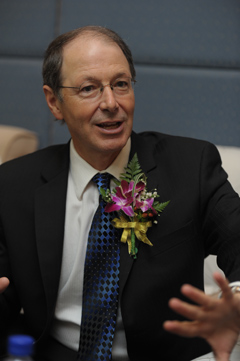 |
|
"I have a lot of dreams about what I think we can be doing. I strongly believe we can do anything if we actually believe in it and work hard enough at it. And so I am always pushing us and I am never satisfied with what we have done. And I want to keep doing more." |
Humble beginnings
"I grew up in a family where you felt good if there was food on the table. The main job of my dad was helping my grandfather with a wholesale distributing company. He did a bunch of other stuff. When I went to Stanford, I went on a poverty program. We qualified because my parents had no money. I put myself through college. I did pretty much everything. I was a buss boy. I worked in the dish room. I was a fry cook. I tutored. I did everything I could to make extra money. I wasn't getting any money, and Stanford wasn't cheap."
Rashid said computing took him into an optimistic world in which people thought they could change things. So what is happening now?
"The combination of the Internet really connecting all the scientists and giving them an ability to share information in an unprecedented way, plus the ability now to have astronomical amounts of data available and to be able to process that data in data centers of hundreds of thousands of machines - I mean, we have basically planet-scale data centers now - we are operating on a computational scale that has never been seen before. What it's doing is it's really transforming the sciences. We can now see relationships between things that you could never see before. We have got people understanding fundamental aspects of diseases and disease-flow, of genetics and genetic relationships. There are understandings of human structures. They are looking at how economies actually work, not by doing what governments do, which is to go out and ask everyone how much money they have and how much money they took in that week and so forth, but by looking at the flows of human beings in cities by tracking GPS (global positioning satellites), by looking at fleet vehicles, by looking at cell phones. You can look at things like search data. You can see these trends. If there's a disease, people are looking for cures. You'll see that before the CDC (Center for Disease Control) hears anything. It'll be instantaneous. It'll be online. Suddenly you'll see something happening. All of this knowledge is driving science really in a very accelerated way and it's bringing the sciences together. We are suddenly realizing there are things that people thought were very distinctly in physics or in computer science or in mathematics - they are suddenly realizing, 'No, those are actually all the same problem'. Twenty or 30 years ago you would never get those people in the same place to talk. Now, that exchange of information that is going on through the Internet."
Answering critics
Some critics accuse Microsoft Research of not being product-oriented enough. Others say it is too product-oriented. Rashid dismisses both viewpoints. He drew on the Microsoft product Kinect as an example. Kinect is a motion-sensing device for the Xbox 360 video game console. It is equipped with a webcam-style camera that allows players to control and interact with a game without the use of a console. It rivals Wii Remote Plus and PlayStation Move. After 8 million Kinect units were sold in the first 60 days before Christmas this past year, the product holds the Guinness World Record for being the "fastest selling consumer-electronics device".
"We are moving the state of the art forward but also moving a steady stream of technology. If you look at all the products Microsoft does, we have our hand in just about every place. Kinect is the fruition of a lot of basic research that has been applied to an astronomically successful product. The beauty of it was that it was taking this really hard research area - real-time 3D computer vision - and turning it into a $150 product that anybody could buy. It's revolutionizing what researchers are doing in universities. They never had a tool like that before that was so inexpensive. It is changing their view of what they can do with computers and how they can use them. Yes, we do a lot of very basic, fundamental research, but we (are) also creating a steady stream of technology.
Both Bill (Gates, Microsoft founder) and Steve (Ballmer, Microsoft chief executive officer) have said Microsoft Research is the best investment they have made in terms of ROI (returns on investment).
So what next? "I have a lot of dreams about what I think we can be doing. I strongly believe we can do anything if we actually believe in it and work hard enough at it. And so I am always pushing us and I am never satisfied with what we have done. And I want to keep doing more."
- Agriculture still vital to China
- Agriculture a fertile field for investment
- Banks 'must prepare' for eurozone changes
- Risks to GDP growth rising
- Central SOEs' profits to 900b yuan
- Tourism infrastructure grows stronger
- Fiscal rural spending to exceed 1t yuan
- Chinese buy more foreign currencies in Nov





